人教版八年级英语上册第二单元复习资料
人教版英语八年级上册Unit2复习单词及词性短语句子默写
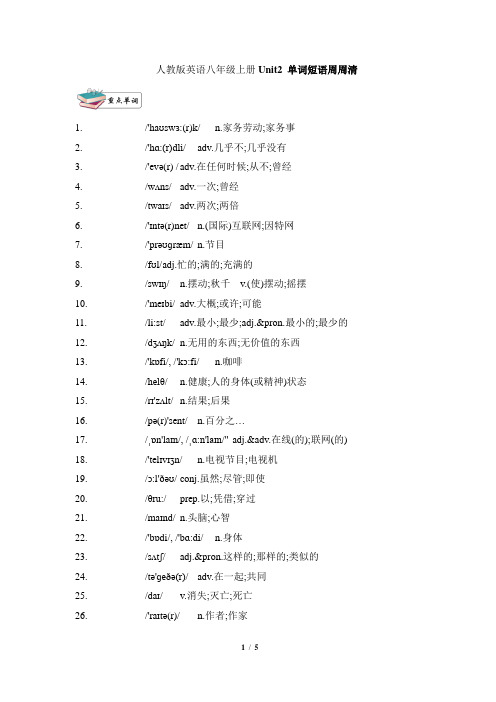
人教版英语八年级上册Unit2 单词短语周周清1.__________ /'haʊswɜ:(r)k/ n.家务劳动;家务事2.__________ /'hɑ:(r)dli/adv.几乎不;几乎没有3.__________ /'evə(r) / adv.在任何时候;从不;曾经4.__________ /wʌns/ adv.一次;曾经5.__________ /twaɪs/ adv.两次;两倍6.__________ /'ɪntə(r)net/ n.(国际)互联网;因特网7.__________ /'prəʊɡræm/ n.节目8.__________ /fʊl/ a dj.忙的;满的;充满的9.__________ /swɪŋ/n.摆动;秋千v.(使)摆动;摇摆10.__________ /'meɪbi/ adv.大概;或许;可能11.__________ /li:st/ adv.最小;最少;adj.&pron.最小的;最少的12.__________ /dʒʌŋk/n.无用的东西;无价值的东西13.__________ /'kɒfi/, /'kɔ:fi/ n.咖啡14.__________ /helθ/n.健康;人的身体(或精神)状态15.__________ /rɪ'zʌlt/ n.结果;后果16.__________ /pə(r)'sent/ n.百分之…17.__________ /ˌɒn'laɪn/, /ˌɑ:n'laɪn/"adj.&adv.在线(的);联网(的)18.__________ /'telɪvɪʒn/ n.电视节目;电视机19.__________ /ɔ:l'ðəʊ/ conj.虽然;尽管;即使20.__________ /θru:/ prep.以;凭借;穿过21.__________ /maɪnd/ n.头脑;心智22.__________ /'bɒdi/, /'bɑ:di/n.身体23.__________ /sʌtʃ/ adj.&pron.这样的;那样的;类似的24.__________ /tə'ɡeðə(r)/adv.在一起;共同25.__________ /daɪ/ v.消失;灭亡;死亡26.__________ /'raɪtə(r)/ n.作者;作家27.__________ /'dentɪst/ n.牙科医生28.__________ /mæɡə'zi:n/, /'mæɡəzi:n/ n.杂志;期刊29.__________ /haʊ'evə(r)/ adv.然而;不过30.__________ /ðən; ðæn/ prep.&conj.(用以引出比较的第二部分)比31.__________ /'ɔ:lməʊst/ adv.几乎;差不多32.__________ /nʌn/ pron.没有一个;毫无33.__________ /les/ a dv.较少;较小;adj.&pron.较少的;更少的34.__________ /pɔɪnt/ n.得分;点1.num. 一__________ →adv. 次;曾经__________2.num. 二__________ →adv.两次;两倍__________3.adj.忙的;满的;充满的__________ →(反义词)__________4. v.(使)摆动;摇摆__________ →(过去式)___________5. n.身体__________ →(复数)__________6. n.健康;人的身体(或精神)状态__________ →adj.健康的__________7. pron.没有一个;毫无__________ →(反义词)__________8. v.写作__________ →(过去式)__________ →n.作家;作者__________9. v.消失;灭亡;死亡_________ →(过去式)__________ →(现在分词)__________10. adj.较少的;更少的_________→(比较级)__________ →(最高级)__________1.看电视_____________________2.使用因特网_______________3.锻炼_______________________4.玩电脑游戏______________5.阅读英语书_______________6.上网___________________7.去看电影_________________8.露营___________________9.去购物___________________ 10.熬夜___________________ 11.帮助做家务______________ 12.进行体育活动__________ 13.上舞蹈和钢琴课___________ 14.去看牙医______________15.和某人一起度过时光_______ 16.业余活动______________ 17.在某人的业余时间________ 18.有空___________________ 19.做某事的最好方式________ 20.在周末__________________ 21.多久一次________________ 22.至少___________________ 23.几乎不_________________ 24.一周一次______________ 25.每月两次________________ 26.最受欢迎的____________ 27.垃圾食品________________ 28.例如__________________ 29.多于__________________ 30.少于__________________1.例如进行体育活动之类的锻炼是很有趣的。
八年级英语上册人教版第二单元知识点汇总
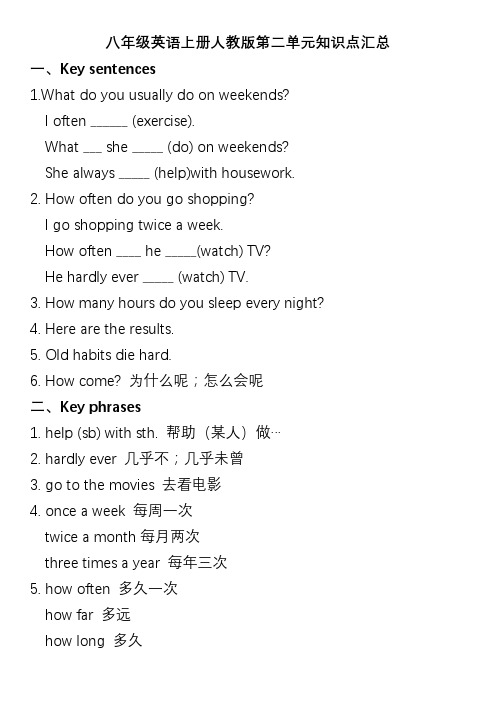
八年级英语上册人教版第二单元知识点汇总一、Key sentences1.What do you usually do on weekends?I often ______ (exercise).What ___ she _____ (do) on weekends?She always _____ (help)with housework.2. How often do you go shopping?I go shopping twice a week.How often ____ he _____(watch) TV?He hardly ever _____ (watch) TV.3. How many hours do you sleep every night?4. Here are the results.5. Old habits die hard.6. How come? 为什么呢;怎么会呢二、Key phrases1. help (sb) with sth. 帮助(某人)做…2. hardly ever 几乎不;几乎未曾3. go to the movies 去看电影4. once a week 每周一次twice a month每月两次three times a year 每年三次5. how often 多久一次how far 多远how long 多久how old 多大(年龄)how many +可数复数多少how much +不可数名词多少6. use the Internet 上网7. play on a swing 荡秋千swing dance 摇摆舞8. at least 至少at most 最多(用于数词前)9. stay up (late)熬夜(到很晚)10. play sports \do sports 做运动11. be good for 对…有好处;有利于…be good at 擅长be good with 善于和…相处12. junk food 垃圾食品13. fifteen percent of students 百分之十五的学生14. not …at all 一点也不;根本也不15. go online 上网16. the answer to the question 问题的答案17. game shows 竞技游戏节目;娱乐节目18. by using the Internet 通过上网(by +doing)19. though exercise 通过锻炼(though +名词)20 such as 例如;比如21. It’s too late 为时已晚;来不及了22. go to the dentist 去看牙医23. ask sb about 问到某人关于…24. more than two hours=over two hours 两个多小时25. less than 少于;不到26. learn more about 多了解;学到更多关于…27. the best way to relax 放松的最佳方式28. have piano lessons 上钢琴课29. have to 不得不;必须don’t have to 不必30. spend time with sb. 和某人一起消磨时光三、Key points1. 辨析: busy fullToday is full for me. = I am busy today.另外,full 还有‘满的,饱的’的意思。
人教版八年级上册英语第二单元知识点
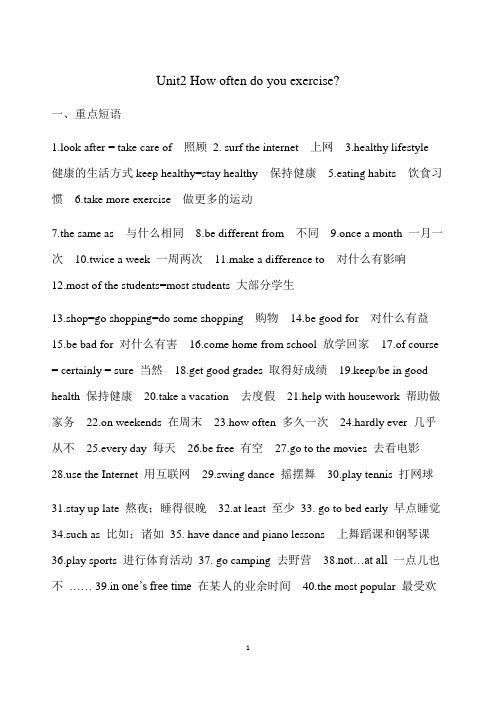
Unit2 How often do you exercise?一、重点短语1.look after = take care of 照顾2. surf the internet 上网3.healthy lifestyle 健康的生活方式keep healthy=stay healthy 保持健康 5.eating habits 饮食习惯 6.take more exercise 做更多的运动7.the same as 与什么相同8.be different from 不同9.once a month 一月一次10.twice a week 一周两次11.make a difference to 对什么有影响12.most of the students=most students 大部分学生13.shop=go shopping=do some shopping 购物14.be good for 对什么有益15.be bad for 对什么有害e home from school 放学回家17.of course = certainly = sure 当然18.get good grades 取得好成绩19.keep/be in good health 保持健康20.take a vacation 去度假21.help with housework 帮助做家务22.on weekends 在周末23.how often 多久一次24.hardly ever 几乎从不25.every day 每天26.be free 有空27.go to the movies 去看电影e the Internet 用互联网29.swing dance 摇摆舞30.play tennis 打网球31.stay up late 熬夜;睡得很晚32.at least 至少33. go to bed early 早点睡觉34.such as 比如;诸如35. have dance and piano lessons 上舞蹈课和钢琴课36.play sports 进行体育活动37. go camping 去野营38.not…at all 一点儿也不…… 39.i n one’s free time 在某人的业余时间40.the most popular 最受欢迎的41.old habits die hard 积习难改42.go to the dentist 去看牙医43.morn than 多于;超过44.less than 少于二、习惯用法1. What’s your favorite……? 你最喜爱的…… 是什么?2. How about…? ...... 怎么样?/ …… 好不好?3.How many+ 可数名词复数+ 一般疑问句?…… 有多少……?4. 主语+find+that 从句. …… 发现……5.. by doing sth. = through + 名词通过做某事6. help sb. with sth. 帮助某人做某事7. spend time with sb. 和某人一起度过时光8. want sb. to do sth. 想让某人做某事9. It’s+ adj.+ to do sth. 做某事的…… 的。
人教版八年级上册英语第二单元知识点复习
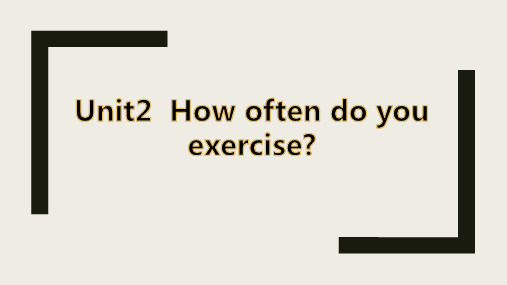
■ 5.go skateboarding 去滑滑板 ■ watch TV看电视
■ 如:As teachers, you must believe■ 22.do housework做家务事
that you can make a difference to
the lives of your students.
■ 73.go shopping=do some shopping购物
■ 57.by doing sth.通过做某事
■ 74.spend time with sb.和某人一起度过时光
■ 58.go online去上网
ቤተ መጻሕፍቲ ባይዱ■ 75.spend time/money on sth.在某方面花费
时间或金钱
■ 59.the answer to the question问题的答案 ■ 76.spend time/money (in) doing sth.花费时
查结果
蔬菜
■ 36.hardly= almost not几乎不
■ 51.improve your English 提高你的英语
■ 65.hardly ever几乎从不
■ 52.drink milk 喝牛奶
■ 66.swing dance摇摆舞
■ 53.pretty healthy 相当健康 pretty,adv. 相 ■ 67.go to bed early早点睡觉
■ how many times 多少次 ,用来提
问做某事的次数
■ 9.take more exercise 做更多的运动
■ 16.although=though虽然 <不能与
■ 10.be the same as 与什么相同
初中英语 人教版八年级上册第二单元知识点
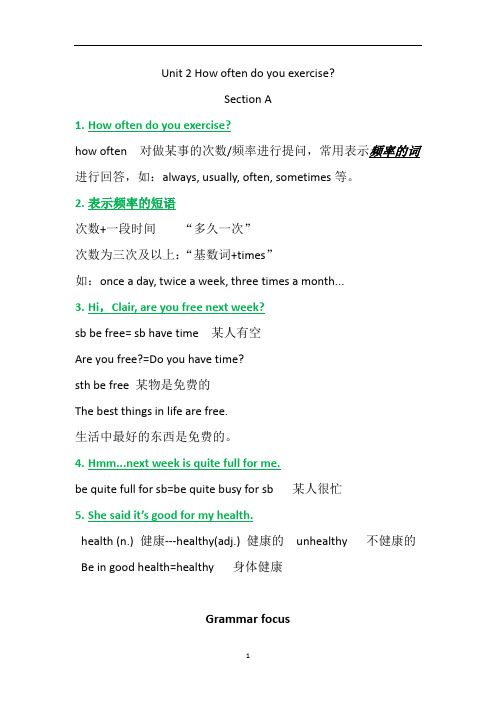
Unit 2 How often do you exercise?Section A1.How often do you exercise?how often 对做某事的次数/频率进行提问,常用表示频率的词进行回答,如:always, usually, often, sometimes等。
2.表示频率的短语次数+一段时间“多久一次”次数为三次及以上:“基数词+times”如:once a day, twice a week, three times a month...3.Hi,Clair, are you free next week?sb be free= sb have time 某人有空Are you free?=Do you have time?sth be free 某物是免费的The best things in life are free.生活中最好的东西是免费的。
4.Hmm...next week is quite full for me.be quite full for sb=be quite busy for sb 某人很忙5.She said it’s good for my health.health (n.) 健康---healthy(adj.) 健康的unhealthy 不健康的Be in good health=healthy 身体健康Grammar focus6.How often的用法how often 用来对表示做某事的频率进行提问,回答时可以用表示频率副词或表示频率的短语进行回答。
如:---How often do you go shopping?(1)---I often go shopping. (频率副词回答)(2)---I go shopping twice a week. (频率短语回答)2.频率副词位置:be之后,动之前。
(be动词之后,Shiite动词之前)频率词及发生概率大小(由大到小):Always, usually, often, sometimes, hardly ever, never(100%--0%) 3.频率短语位置:句尾次数+一段时间如:---How often do you watch TV?---I watch TV twice a week.4.与how相关的短语(1)怎么,怎样。
人教版八年级上册英语第二单元知识点总结
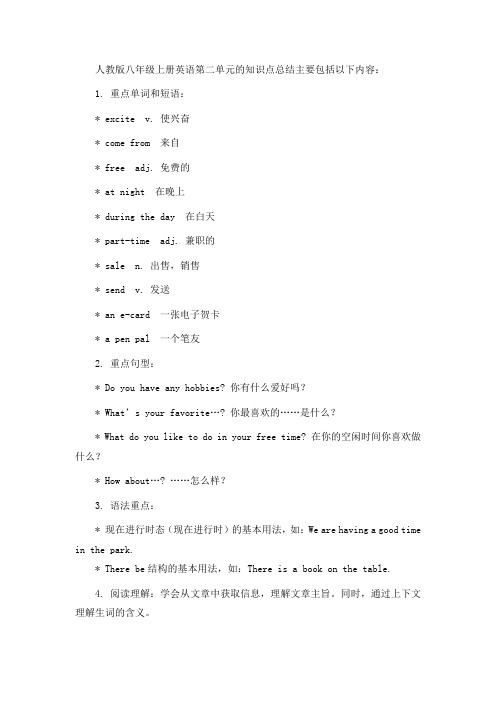
人教版八年级上册英语第二单元的知识点总结主要包括以下内容:1. 重点单词和短语:* excite v. 使兴奋* come from 来自* free adj. 免费的* at night 在晚上* during the day 在白天* part-time adj. 兼职的* sale n. 出售,销售* send v. 发送* an e-card 一张电子贺卡* a pen pal 一个笔友2. 重点句型:* Do you have any hobbies? 你有什么爱好吗?* What’s your favorite…? 你最喜欢的……是什么?* What do you like to do in your free time? 在你的空闲时间你喜欢做什么?* How about…? ……怎么样?3. 语法重点:* 现在进行时态(现在进行时)的基本用法,如:We are having a good time in the park.* There be结构的基本用法,如:There is a book on the table.4. 阅读理解:学会从文章中获取信息,理解文章主旨。
同时,通过上下文理解生词的含义。
5. 写作练习:学会描述自己的爱好、空闲时间活动等,可以通过写日记、邮件等方式进行练习。
6. 听力训练:通过听力材料,提高听力和理解能力,同时学习常用的日常交际用语。
7. 口语练习:通过角色扮演、小组讨论等方式,练习口语表达和交流能力。
8. 文化背景知识:了解不同国家的文化背景和习惯用语,提高跨文化交际能力。
以上是第二单元的主要知识点总结,学生需要重点掌握并熟练运用。
同时,通过大量的阅读、写作、听力和口语练习,提高英语综合运用能力。
初中英语 人教版八年级上册 Unit 2 重点词汇、词组复习及练习
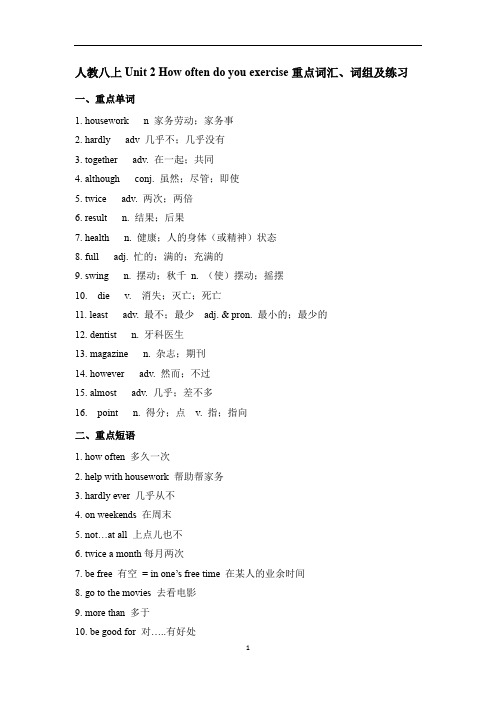
人教八上Unit 2 How often do you exercise重点词汇、词组及练习一、重点单词1. housework n 家务劳动;家务事2. hardly adv 几乎不;几乎没有3. together adv. 在一起;共同4. although conj. 虽然;尽管;即使5. twice adv. 两次;两倍6. result n. 结果;后果7. health n. 健康;人的身体(或精神)状态8. full adj. 忙的;满的;充满的9. swing n. 摆动;秋千n. (使)摆动;摇摆10. die v. 消失;灭亡;死亡11. least adv. 最不;最少adj. & pron. 最小的;最少的12. dentist n. 牙科医生13. magazine n. 杂志;期刊14. however adv. 然而;不过15. almost adv. 几乎;差不多16. point n. 得分;点v. 指;指向二、重点短语1. how often 多久一次2. help with housework 帮助帮家务3. hardly ever 几乎从不4. on weekends 在周末5. not…at all 上点儿也不6. twice a month每月两次7. be free 有空= in one’s free time 在某人的业余时间8. go to the movies 去看电影9. more than 多于10. be good for 对…..有好处11. junk food 垃圾食品12. such as 例如;像……这样13. stay up late 熬夜;睡得很晚14. at least 至少;不少于;起码15. play sports 进行体育活动16. go online 上网17. the best way to do sth. 做某事的最好方式三、词性转换1. one—once(副词)2. empty/ hungry—full(反义词)3. little—less(比较级)—least(最高级)4. healthy adj.健康的—health(名词)5. body n. 身体—bodies (复数)6. die v.死亡—dying (现在分词)—died (过去式)7. write v. 写—writer (名词,指人)—wrote(过去式)四、巩固练习I.写单词。
八年级英语上册第二单元重要考点归纳人教版
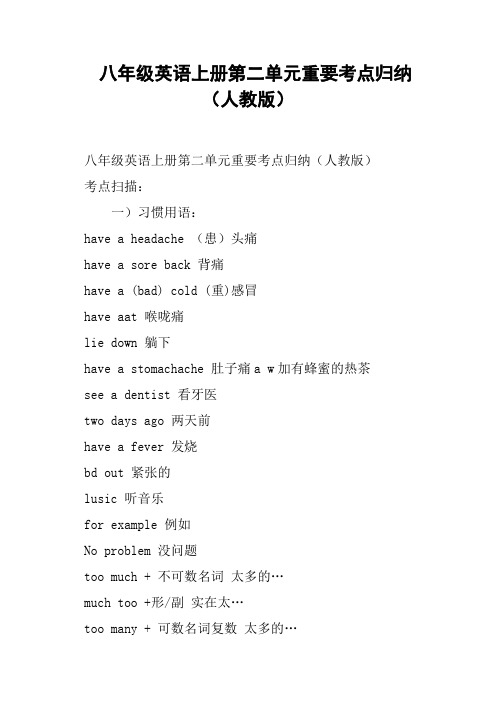
八年级英语上册第二单元重要考点归纳(人教版)八年级英语上册第二单元重要考点归纳(人教版)考点扫描:一)习惯用语:have a headache (患)头痛have a sore back 背痛have a (bad) cold (重)感冒have aat 喉咙痛lie down 躺下have a stomachache 肚子痛a w加有蜂蜜的热茶see a dentist 看牙医two days ago 两天前have a fever 发烧bd out 紧张的lusic 听音乐for example 例如No problem 没问题too much + 不可数名词太多的…much too +形/副实在太…too many + 可数名词复数太多的…a balanced diet 平衡饮食have a rest 休息a few + 可数名词复数少许…a little + 不可数名词/形/副一点…aw 此时,此刻amily 寄宿家庭good idea 好主意yang foods 阳性食物healthy food 健康食品versation practice 对话练习a lot of 很多二)重点句型:I have aat. 我喉咙痛。
2. Maybe you should see a d也许你应该看看牙医。
3. You should eat hot yang foods, like b你应该吃热的阳性食品,像牛肉。
4. I’d out. 我压力太大。
5. It’ant to eat a balanced diet. 平衡饮食很重要。
6. You should eat fruit andalthy food.你应该吃水果和其它的健康食品。
7. You should lie down and rest. 你应该躺下来休息。
8. I like to lusic. 我喜欢听音乐。
9. I really needversation practice. 我的确需要一些对话练习。
- 1、下载文档前请自行甄别文档内容的完整性,平台不提供额外的编辑、内容补充、找答案等附加服务。
- 2、"仅部分预览"的文档,不可在线预览部分如存在完整性等问题,可反馈申请退款(可完整预览的文档不适用该条件!)。
- 3、如文档侵犯您的权益,请联系客服反馈,我们会尽快为您处理(人工客服工作时间:9:00-18:30)。
考点扫描:一)习惯用语:have a headache (患)头痛have a sore back 背痛have a (bad) cold (重)感冒have a sore throat 喉咙痛lie down 躺下have a stomachache 肚子痛hot tea with honey 加有蜂蜜的热茶see a dentist 看牙医two days ago 两天前have a fever 发烧be stressed out 紧张的listen to music 听音乐for example 例如No problem 没问题too much + 不可数名词太多的…much too +形/副实在太…too many + 可数名词复数太多的…a balanced diet 平衡饮食have a rest 休息a few + 可数名词复数少许…a little + 不可数名词/形/副一点…at the moment=now 此时,此刻host family 寄宿家庭good idea 好主意yang foods 阳性食物healthy food 健康食品conversation practice 对话练习a lot of 很多二)重点句型:1. I have a sore throat. 我喉咙痛。
2. Maybe you should see a dentist. 也许你应该看看牙医。
3. You should eat hot yang foods, like beef .你应该吃热的阳性食品,像牛肉。
4. I’m stressed out. 我压力太大。
5. It’s important to eat a balanced diet. 平衡饮食很重要。
6. You should eat fruit and other healthy food.你应该吃水果和其它的健康食品。
7. You should lie down and rest. 你应该躺下来休息。
8. I like to listen to music. 我喜欢听音乐。
9. I really need some conversation practice. 我的确需要一些对话练习。
10.I have a lot of headaches. 我头痛得很厉害。
11.What’s the matter (with you )? (你)怎么啦?I’m not feeling well. 我感觉不舒服。
12.That’s a good idea. 好主意。
13.I hope you feel better soon. 我希望你尽快好起来。
三)交际用语:——What's the matter? ——I have a headache.——You should drink some tea. —— That sounds like a good idea. ——I have a sore back .——That's too bad. I hope you feel better soon.四)主题写作:谈论健康、并能给人提一些养生的建议。
词语点击:1.matter:[′mætə]1)名词n. ①事情;问题;事件[C]It was a matter of life and death for them.这事对他们来说是生死攸关。
②麻烦事,毛病[the S][(+with)]What is the matter with this car?这辆汽车出了什么毛病?2)不及物动词vi.①(常用于否定句和疑问句)有关系,要紧。
All these things do not matter now.所有这一切现在都无关紧要了。
②It does not matter(if…)(即使……也)不要紧例如:When talking about fighting battles, Comrade Liu Bocheng often quotes a Sichuan proverb "It does not matter if it is a yellow cat or a black cat, as long as it catches mice."刘伯承同志经常讲一句四川话:“黄猫、黑猫,只要捉住老鼠就是好猫。
”这是说的打仗2.back: [bæk]1)名词n.①背脊,背部[C]Someone patted me on the back. 有人在我背上轻轻地拍了一下。
②后部[the S][(+of)]Grandpa and grandma sat in the back of the car.爷爷和奶奶坐在汽车后排的座位上。
2)副词adv..在原处;回原处Joan and I walked back to the college.我和琼步行回到学校。
形容词adj. [Z]后面的,后部的He sat in the back seat of the car. 他坐在车子后面的座位上。
3.rest:[rest]1)不及物动词vi. 休息;睡;安息,长眠[(+from)]Mrs. Whitman rests with her husband. 惠特曼太太与先生长眠一处。
2) 及物动词vt. 使休息;使安息;使轻松The doctor tried to rest his patient's mind at ease.医生设法让病人安下心来。
3) 名词n. 剩余部分;其余的人;其余The rest of the eggs have gone bad. 其余的鸡蛋都变质了。
4.ago: [ə′gəu]副词adv. 在...以前,要置于一段时间之后,不可单独使用,指从现在看一段时间以前。
We visited France about three years ago. 我们大约三年前去法国游玩过。
5.so: [səu]1)副词adv. 这么,那么;【口】多么,非常I'm so pleased to see you. 看到你我真高兴。
2)连接词conj. 因此,所以,它不能与because连用。
The monitor was ill so I went in his place班长病了所以我代他去。
3)如此,这样,为了避免重复前面所说过的内容,可与believe,do,expect,hope,think等表示看法、意见的动词及I'm afraid连用。
例如:——I think the weather will be fine. ——I think so.6.illness:[′ilnis]名词n.患病(状态);身体不适[U]During his illness, John stayed indoors.约翰在生病期间足不出户。
它是由形容词ill+名词后缀-ness构成,其同义词为sickness.【拓展】类似的词有:carelessness粗心;happiness幸福;darkness黑暗;kindness好意7.stress:[stres]1)名词n. 压力;紧张;压迫[U][C][(+on)]Susan was completely weighed down by the stress of examinations.苏珊被考试的压力压垮了2)及物动词vt.加压力于;使紧张The weight of snow stressed the roof to the point of collapsing.雪的重量压得屋顶快要塌了。
3)be stressed out意为“有压力的,紧张的”。
Susan was so stressed out that she needed to relax herself.苏珊太紧张了,她需要放松自己。
8.way: [wei]名词n. ①路,通路,道路[C]Can you show me the way to the Post Office? 你能否告诉我去邮局的路?②路程,距离[the S]It's a long way to the railroad station.到火车站路程很远。
③方法,方式[C][ (+to-v)]Scientists are trying to find ways to prevent disease.科学家们正试图找到防④方向Come this way,please.请这边来。
【短语】1)on the/one'sway (to)…在去某地的路上。
例如:On the way to the airport,they hear the report.在去机场的路上,他们听到了这个报道。
in many/some ways 在许多/一些方面.例如;In some ways you are right.在某些方面你是对的。
【拓展】believe,think,supposed等词的宾语从句若要表示否定意义,需否定转移,即否定主句的谓语动词。
例如:I don't think he could do that in that way.我相信他不会那样做。
9.weak:[wi:k]形容词adj. 弱的,虚弱的;衰弱的,它的名词形式为weakness,同音词为week(星期)She is still weak after her long illness. 久病之后她仍很虚弱。
10.angry:[′æŋgri]形容词adj.愤怒的,生气的,其副词形式为angrily.1)be angry with sb.生某人的气;2)be angry at sth.因某事生气。
例如:I was angry with him for keeping me waiting.我对他很生气,因为他让我等了好久。
What are you angry at?你因何事生气?The man left the room angrily.那个人生气地离开了房间。
11.medicine:[′medisin]名词n. 药,内服药(不可数名词)Why did the patient refuse to take the medicine?那个病人为什么不肯服药?其形容词为medical医学的、医疗的The soldiers at front needed medical care greatly.前线的士兵急需医护。
“吃药”要用动词take或have,不要用eat或drink.Please take this medicine.请把这些药吃了。
